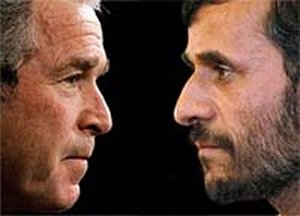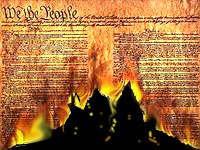On August 14th, not long after the ceasefire in
Lebanon took place,
President Bush declared, "
Hezbollah attacked
Israel. Hezbollah started the crisis, and Hezbollah suffered a defeat in this crisis." Israeli
Prime Minister Ehud Olmert echoed a restrained version of that sentiment,
stating that Israel had dealt Hezbollah a "harsh blow." Hezbollah leader
Sheikh Hassan Nasrallah, meanwhile,
laid claim to a "strategic, historic victory."
Clearly, only one side of this debate can be correct. Unfortunately - but perhaps not unexpectedly, given past performance - it is not President Bush.
Hezbollah did indeed suffer losses, and was driven out of southern Lebanon, but the "Party of God" was clearly not routed. On the day prior to the ceasefire, Hezbollah poured more rockets into Israel than they ever had on any single day in the past, and the organization's intent - at least in this go-round - was neither to erase Israel from the map, nor dig in and repel the Israeli Defense Force (IDF) at the border. Rather, as Sheikh Nasrallah said early on, Hezbollah's goal was to survive, and survive it did.
Israel's stated objective, on the other hand, was the complete obliteration of Hezbollah, which was foolish, given Israel’s own
previous experiences in Lebanon. It may be that Olmert, who lacks the military background of either opposition
Likud Party leader
Benjamin Netanyahu or his own predecessor,
Ariel Sharon, was more bellicose than required out of a need to prove his security credentials, but whatever the reason, a
new poll finds that 63% of Israelis want Olmert to resign because of his failure.
So where was the United States in all of this?
Was the Bush Administration applying lessons learned in
Iraq to Lebanon? Was it counseling Israel to be careful about both its rhetoric and its military goals because of their potential impact on future security and relations among the countries of the region? Was the U.S. diplomatic corps in full throat, hounding all parties for an end to the bloodshed that killed more than 1,100 Lebanese and nearly 160 Israelis? Was it continuing to build on a Middle East peace effort that works to incrementally address the underlying causes of tensions in the
Levant?
For those not already familiar with this White House's heady record of failure, the answers are as follows. No lessons have been learned in Iraq, since the stated policy in our ill-conceived occupation of that country is to
stay the course, and therefore, none were applied to Lebanon.
Secretary of State Condoleezza Rice only backed the shakiest of ceasefires once it became clear that the administration's historically unsupported dream of making an example of Hezbollah - and that Israel's war against Hezbollah would
provide a template for an invasion of
Iran - wasn't going to bear fruit. And any peace process focused on Israel and the
Palestinians was abandoned when the latter
elected Hamas to a parliamentary majority.
The ground has shifted under Israel's feet, and not for the better. For forty years, Israel has been regarded as essentially invincible by its opponents in the region, and no country has directly attacked the Jewish state. In surviving, Hezbollah has demonstrated that Israel is casualty-averse, and crossed a threshold of success against its sworn enemy that, while perhaps low from a military perspective, is of nearly unprecedented significance among the countries of the Middle East. If Hezbollah can effectively fight Israel to a standstill through tactics that force the IDF to absorb more casualties than are acceptable, might not a state, with greater resources, inflict even more damage? If that is possible, then might it not be possible that Israel could be defeated? Such are the thoughts that are almost undoubtedly running through the minds of Israel's enemies.
The most potent of those enemies, and the region's rising force, is Iran, which has been working steadily to consolidate power in the Islamic world.
Tehran has bolstered the rise of the
Shia in Iraq, buttressed Hezbollah's victory against Israel, and remains firmly in control of the
ongoing controversy over its nuclear ambitions, which it continues to manipulate adeptly. In the aftermath of Israel's failure, Iran clearly believes that its star is on the rise, and it is at least somewhat justified in that thinking. Tehran's ambition - despite all manner of wild rhetoric from
President Mahmoud Ahmadinejad - is not to destroy the United States. Instead, it is to become the pre-eminent regional power in the Middle East, and the leading alternative to Western influence.
Iran has played the Bush Administration masterfully. With Israel paralyzed for the moment and the U.S. entangled in what is finally being recognized as civil war in Iraq, the likelihood that the United States or its allies will be able to use military force for "regime change" - or even just to curtail Iran's ambitions - is at a nadir. The
United Nations Security Council has developed a
list of sanctions for other nations to implement against Iran, but the industrialized world will not do anything to interrupt Iranian oil exports, and neither
China nor
Russia can be counted on to support them, with the latter already having
stated it will not back sanctions at this time.
In 2002, as chronicled in
Ron Suskind's excellent
The One Percent Doctrine,
Vice President Dick Cheney said the following:
The elected leaders of this country have a responsibility to consider all of the available options, and we are doing so. What we must not do in the face of a mortal threat is to give in to wishful thinking or willful blindness. We will not simply look away, hope for the best, and leave the matter for some future administration to resolve.
The irony is palpable. Rather than work diligently to understand the region and create leverage diplomatically, the Bush Administration solution was to blunder into Iraq, ignoring facts and advice that ran counter to their desires, and fervently hoping that somehow the surrounding nations would embrace
Jeffersonian democracy and
American capitalism, despite all historical evidence to the contrary. To illustrate just how far this White House has fallen from Cheney's lofty proclamations, President Bush just last week
stated, "We're not leaving, so long as I'm the president," apparently more than willing at this point to let his successor figure out an exit strategy.
We sit exposed, victims of our president's bravado and ignorance, increasingly demonized, mocked and outmaneuvered because our diplomatic corps is strangled by the likes of
John Bolton and Condoleezza Rice. Our regional proxy has been neutered for the moment, and every fresh blunder from the White House emboldens our adversaries. Because President Bush lives in a world of good and evil where heartfelt wishes do, in fact, trump reality, and the only required accountability is loyalty to ideology, the United States has no cards left to play in the Middle East without resorting to nuclear war.
If there was any remaining doubt that this president and his band of hacks has thoroughly blown it, it should be long dead in the wake of this utter disaster in policy and forward planning. While successful foreign policy certainly doesn't require one to agree with adversaries or even allies, the Bush White House is hamstrung by a fundamental inability to view events from the perspective of others. It is continually blindsided by the fact that not everyone thinks like wealthy Republicans who believe history doesn't matter. It is a willful child refusing to learn from its own experience, guided solely by an irrational belief that "this time, things will all work out." As a nation, we pay the price for this irrational belief, and will continue to do so, as long as George W. Bush is president.





